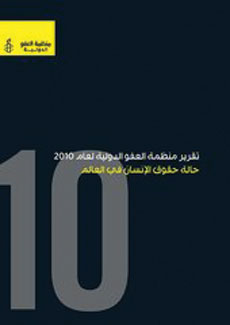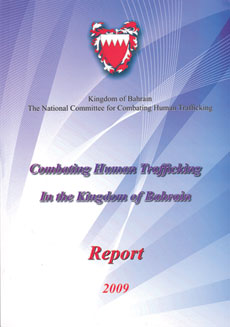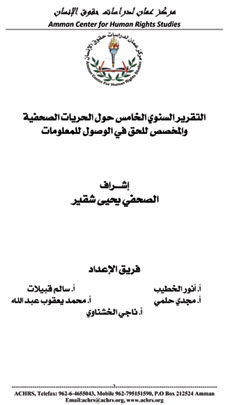
|
 |
 |
|
|
|
|
|
|
|
|
|
|
|
|
|
|
|
|
|
|
|
|
|
|
Bahrain in Human Rights ReportsBahrain Ranked Third in the Arab World on the Right of Access to InformationMay 2010 has witnessed the publication of a number of local and international human rights reports on Bahrain. The reports highlighted the developments, which took place on specific human rights fields, and included some suggestions and criticisms to specific areas which require more efforts from the Government in order to improve Bahrain’s human rights record internationally. Amnesty: Investigating Torture Allegations
Amnesty International issued its annual report on 27 May 2010, which covers human rights developments in 2009. The summary of the report on Bahrain was as follows: ‘the Government took steps to promote human rights and improve conditions for some migrant workers. However, it continued to penalize criticism of the royal family and failed to investigate allegations of torture in 2008. One person remained at risk of execution’. The report also referred to the establishment of the National Foundation for Human Rights, and said the Government was considering withdrawing some of its reservations from key international human rights treaties it had ratified. The Government also said that it will introduce various legal reforms and provide human rights training to judicial and other officials. The report also - without declaring Amnesty’s position - pointed to the use of the Shozin weapon during violent clashes, and said that the Government had refuted the use of excessive force claiming that security forces had only intervened when the protest became violent. The report also mentioned the royal pardon of 178 prisoners accused of involvement in violence in order to overthrow the Government’. With regards to freedom of expression, the report said that ‘the Bahraini Government remained especially sensitive to criticism of the monarchy’. Also, amendments to the 2002 Press and Publications Law, proposed in 2008, remained pending before the House of Representatives. If implemented, the amendments would remove imprisonment as a penalty for those convicted of criticizing the King or “inciting hatred of the regime”. The report added that in January, the Ministry of Information and Culture blocked a number of websites, blogs and discussion forums, including some deemed to “incite hatred and sectarian violence”. With regards to migrant rights, the report stated that ‘the Government announced a revision of the sponsorship system – known as kafala – through which foreign migrant workers obtain employment. The new system, which came into force on 1 August, permits foreign workers to change their employment without obtaining their current employer’s consent. However, the report added that the new amendment does not apply to domestic workers, most of whom are women, which makes them subject to abuses at the hand of their employers. Combating Human Trafficking
On April 2010, the National Commission to Combat Trafficking issued its first report entitled ’Combating Human Trafficking in the Kingdom of Bahrain’. The report introduction mentioned that ‘the Kingdom of Bahrain, like many countries of the world, is suffering from the phenomena of trafficking in persons’. The report presented the legislative developments to combat human trafficking, which are included in the Bahraini 1976 Penal Code. It also presented other Government legislations related to the same issue including the Legislative Decree No. 16 (1988) on transplant of human organs, Legislative Decree No. 23 (1976) promulgating the Labour Law and Immigration and Residence Law issued in 1965. Finally the report included Law No. 1 (2008) with respect to trafficking in persons. The report also included measures and decisions undertaken by Government bodies in order to combat human trafficking crimes such as the establishment of a specialized unit and introducing measures with regard to immigration and passports. This includes not deporting any foreign worker unless an order is issued by the judicial authority, setting up a hot line to receive complaints, providing shelter for the victims and the issuing of guidelines booklets on the rights of expatriate workers in several languages by LMRA. The report listed all the training courses that Bahrain organized during the last years, either alone or with the collaboration of local and international civil society, UN agencies and international organizations such as the IOM. The report listed a number of cases related to human trafficking in which the judiciary had intervened, and the investigations and trials had taken place involving foreign and Bahraini citizens. Finally, the report stressed the Kingdom of Bahrain’s determination to eradicate the phenomena of trafficking in persons, through the development of legislations and by urging relevant authorities to apply preventative and deterrent measures to stop trafficking and to increase bilateral and international cooperation to combat this crime. The Right of Access to Information
The Amman Centre for Human Rights Studies (ACHRS) published its fifth report on press freedom and the right of access to information. The report assessed Arab countries based on Article 19 of the Universal Declaration of Human Rights which states that ‘everyone has the right to freedom of opinion and expression. This right includes freedom to hold opinions without interference, impart and receive information and ideas through any media and regardless of frontier’. It was also based on Article 19 of the International Convent on Civil and Political Rights (ICCPR) which states that ‘everyone has the right to hold opinions without interference. And that everyone has the right to freedom of expression. This right shall include freedom to seek various forms of information and ideas, receive and impart to others regardless of frontiers, either in writing or in print, in the form of art, or any other media of his choice’. The Amman Centre has designed an indicator to measure freedom of access to information in the Arab world. The indicator is based on two pillars, firstly the legal indicator, which deals with constitutional provisions in a given country, and whether its government has ratified the ICCPR. Secondly, an indicator for practical performance which is defined by ’Article 19 Organization’ regarding citizens’ rights to access information, which includes revealing information, obliging public institutions to publish basic information, promoting an open Government effectively, making exceptions clear, specific and subject only to the principle of “harm and public interest”, and dealing with information requests. Based on the two pillars of indicators, the position of the countries is defined through their performance and legislations on the freedom of access to information. It has to be said that the legal indicator represents 60% and performance indicator represents 40% of the overall weight. The ACHRS concluded that Jordan had achieved (87%), Yemen (82%) and Bahrain (78%) thereby occupying the three first places, while Saudi Arabia had scored (%26), Syria (%23) and Libya (%23) thereby occupying the bottom of the list. With regards to Bahrain, the report looked at three articles in the Press Law namely; articles 31, 32 and 33 providing for the right of journalists to access information. However, the report added that ‘despite these articles there are no practical guarantees to provide journalists with information’. It added that ‘there is an active movement in Bahrain, which demands the issuing of a separate law for the right of access to information’. The report also added that ‘Bahrain is expected to be the first state in the GCC to give the right to each natural or corporeal person to access information’. Authors of the report followed and observed the Bahraini press, Parliament and civil society’s active debate on the issue. |


